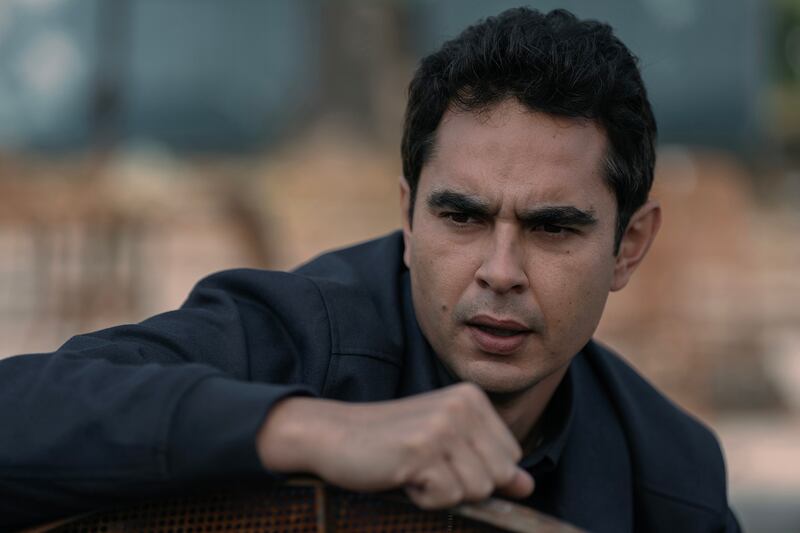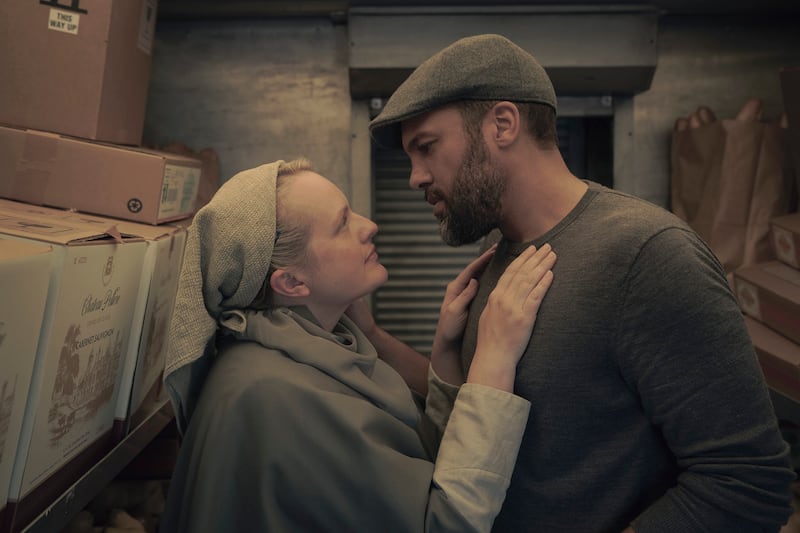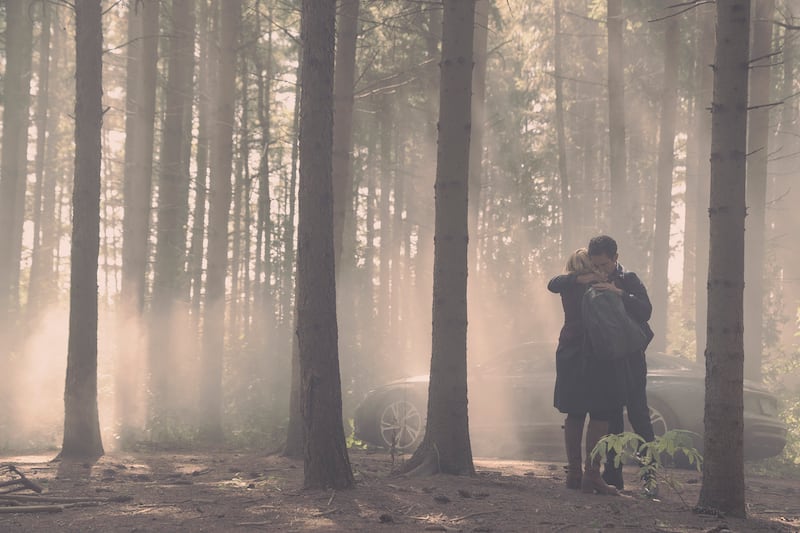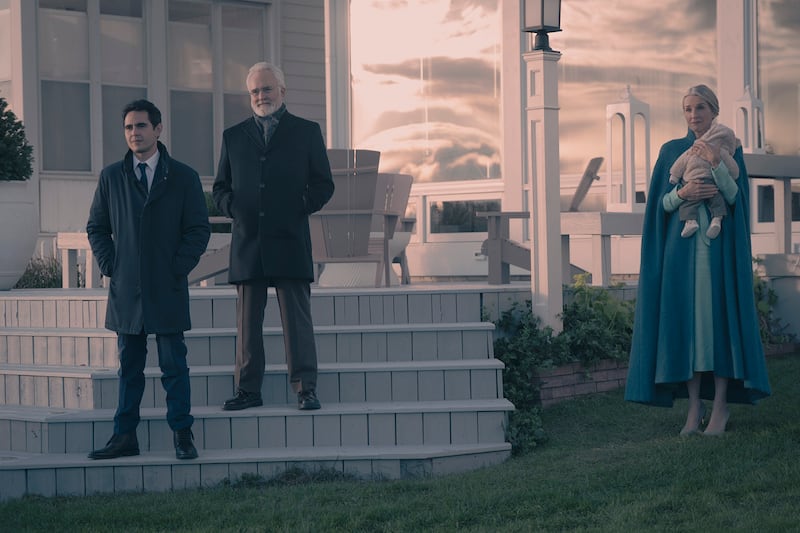(Warning: Spoilers ahead.)
It seems unlikely that The Handmaid’s Tale is going to end with June Osborne (Elisabeth Moss) and Nick Blaine (Max Minghella) running off into the sunset together. Even less likely after the shocking events at the end of this week’s episode, aptly titled, “Surprise.”
Hawaii has previously been floated as a fantasy destination for the couple when they imagined an alternative world where they could raise their child together; now Paris is added to that short list. However, Gilead still exists; Nick is now a commander, and June’s active role in the Mayday rebellion (alongside her husband, Luke) puts them on a collision course.
Up until this point, Nick has been June’s man on the inside, her get-out-of-jail-free card for all Gilead-related traps, and still, sometimes forbidden love. But when backed into a corner by his father-in-law, High Commander Gabriel Wharton (Josh Charles), Nick reveals the Mayday plan to assassinate a group of commanders when they will be distracted at Jezebel’s. Wharton doesn’t partake in the not-so-secret brothel activity and is giddy to have a reason to shut it down. He brags about this win to his fiancée, Serena Joy (Yvonne Strahovski), citing Nick as the source of the intel; meanwhile, June is hiding in a nearby closet with Nick and hears everything.
No wonder Nick tried to quickly get June on a plane to Paris so she didn’t find out what he had done. “As somebody who plays Nick, I believe a lot of decisions he makes in that episode specifically are panicked ones and ones made under duress and cloudy thinking,” Max Minghella tells The Daily Beast Obsessed.

Talking over Zoom from Cardiff, Wales, where the Emmy-nominated actor is currently filming Season 4 of Industry, Minghella doesn’t leap into defensive mode, but is pragmatic about Nick’s actions in this episode (and Season 6 as a whole). “Often, characters in shows behave in quite binary ways; good and bad. I think he makes a horrible decision, but it’s one that actually doesn’t necessarily come from a calculated place, and that’s interesting,” he says. That might be small comfort to fans of this couple. Still, Minghella explains it as a “privilege of playing a character for this long” that he gets to dig into Nick’s human flaws.
“It’s not all the time you get to explore somebody for this many hours of television,” he says. “What comes with that is the ability to see all the facets of who a person is and how they behave under extreme circumstances.” In this case, Nick crumbles in a way we haven’t previously seen and begins to resemble the kind of Gilead monster June’s mother warned he would show himself to be.
When I try to get him to offer some hints of what to expect after this schism, he demurs. “I’m not going to answer that question in a satisfying way,” says Minghella. “I think one of the joys of reading the season was I was genuinely surprised by many things that happened, and that’s really hard to do six seasons into a show.” The only inkling is that the writers have made some “pretty ballsy decisions” that he hopes will satisfy audiences. (He also remained tight-lipped about all things Industry, and Minghella is good at keeping secrets)
The Handmaid’s Tale began shooting in the fall of 2016, and it has become common to compare the current political climate, in which Roe v. Wade was overturned (among many other things), to that of the terrifying fictional world created by Margaret Atwood in 1985. When dystopian-like events are occurring in real time, The Handmaid’s Tale is less like a cautionary tale and more like a mirror.

Hope still exists for June and the resistance (even if Nick’s deception suggests otherwise), and Minghella understands why those looking to escape the news have avoided The Handmaid’s Tale. “I think there is an impression of the show from people who haven’t seen it that is often allocated a certain kind of intellectualism or homework quality to it that it doesn’t really possess,” he says.
Other than the LA premiere, Minghella hasn’t watched any of this season because he likes to wait until all the episodes are available to “get swept up in it,” and he is drawn to the big relationship swings. “I know that Lizzie [Moss] and I specifically really respond to the soap opera element of The Handmaid’s Tale‚” he says. “It’s a show that does not shy away from embracing great dramatic conflicts, and really has fun with that. It’s not a naturalistic show at all.”
Take the pointed imagery during the big reveal, where Serena’s closet resembles a confessional booth, with June in the light and Nick in the dark. A gulf grows between the pair in what is a tiny space, but becomes a cavern to reflect June’s disbelief. Minghella thinks these symbolic moments pack a powerful punch: “I think it’s when the show succeeds the most is when it leans into the melodrama of the story.”
Before this reality check, June is convinced by what seems like a big romantic gesture to leave this misery behind for a new life with their daughter in Paris, though Nick’s change in energy should be a dead giveaway that something is awry. “I think he’s in a really manic state. I don’t think he’s thinking straight. I don’t think he remembers what he’s saying. It’s full anxiety,” says Minghella.

However, you can’t blame June for allowing herself to dream. A flashback earlier in the episode reveals the French capital is a reference to a conversation when June was Fred and Serena Waterford’s handmaid, and Nick was their driver. Minghella thought it was a “fun idea” to revisit this time and was thrilled to spend time back in Nick’s above-the-garage abode. “Selfishly, I was just happy to see it rebuilt, and it was very nostalgic,” he says about this set and scene.
It has been nearly a decade since Minghella and Moss first inhabited these characters. As well as collaborating on screen, Moss has directed 10 episodes of The Handmaid’s Tale, and Minghella directed Moss in Shell. “We’d never met before we started doing Handmaid’s Tale, and I think it’s one of the miracles of this experience has been we got along so well, but also we do, I think, have chemistry together,” Minghella says.

While the actor says neither of them is like their character, one similarity they do share with their on-screen counterparts is that immediate feeling when you meet “like you’ve known them your whole life.” It can be platonic or romantic, but you cannot force this spark to ignite.
“In the case of Nick and June, I think they have that connection,” Minghella says. “From the moment they meet. The first scene we shot together, I think they’re speaking nonsense to one another, but they know what the other person means. There’s an implicit understanding and safety there.”
Acting or directing the other also requires trust and a shorthand. “Lizzie and I have a very different way to that [June and Nick dynamic] but a similar ease with one another where we live our lives in pretty similar ways,” Minghella says. “I think the thing that defines both of us is we’re both workaholics to a kind of unhealthy degree, and yet we don’t take ourselves very seriously.”
Minghella isn’t downplaying the workaholic moniker. Shell premiere at the 2024 Toronto Film Festival the night before Minghella’s first day shooting Season 6, but this is not the first time his schedule has been tight: “On my first film [directing], I wrapped Teen Spirit in London, got on a plane and was shooting the next morning in Toronto [on The Handmaid’s Tale].” Because of this nonstop mindset, Minghella hasn’t had much time to “acknowledge the chapter closing,” between wrapping The Handmaid’s Tale a couple of months ago and starting Industry in March.
He admits that finishing this long-running series has been “very surreal” and is thankful HBO accommodated his request to attend the Los Angeles Handmaid’s Tale premiere in April. “It was so important to me to be there for that. I really wanted to figure out a way to get back for it,” Minghella says. “I wasn’t able to do a lot of press for the show, and that made me sad, because it’s a meaningful part of my life, and I wanted to celebrate with everybody.” The night made him very sentimental, particularly since he didn’t know when (or if) they would all be together in a room.
While the characters inhabit a conflict-heavy world, Minghella calls this experience of playing Nick “a great joy of my life.” It might be more salacious to read about behind-the-scenes feuds, but while Gilead is hell, the making of it has been anything but. “It was a pleasant experience from beginning to end for everybody. Really, nothing bad happened. I think it has got to be pretty singular for a long-running TV show,” Minghella laughs. “Normally, there’s some chaos, and we all got through it as great friends and all grateful to be there.”
The post The Shocking Betrayal That Just Rocked ‘The Handmaid’s Tale’ appeared first on The Daily Beast.




